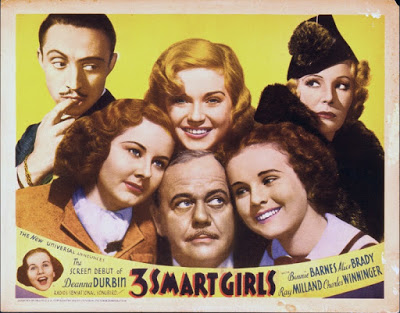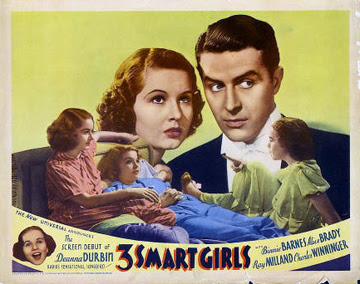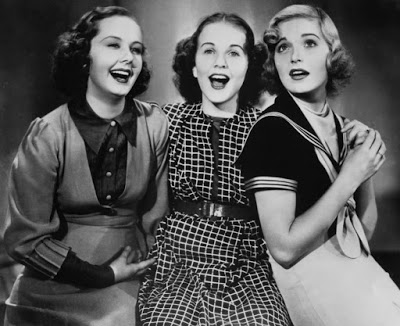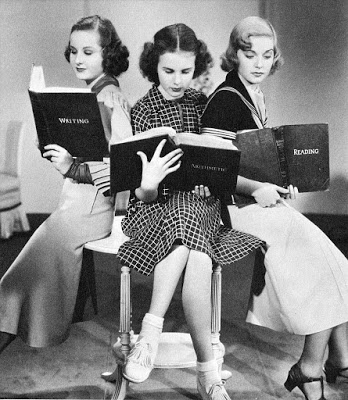Three Smart Girls

Director: Henry Koster
Year: 1936
Rating: 7.5
The film opens with three girls on a sailboat on a lake in Switzerland. Two
of them are in their late teens while the youngest is about fifteen but looks
a few years younger. The younger girl is sitting at the bow of the boat and
suddenly breaks into song while her sisters look on. It is a huge operatic
voice in which she hits scales as easily as if she was playing a piano. Your
first thought is who is dubbing for this girl - no one that small and young
could sing like that. They must hear her in Geneva. But it is in fact her
voice and it carried her to stardom in the time I can eat a sandwich.
A year earlier MGM had to make a decision. They had two teenage girls who
had a lot of singing talent but they really didn't know what to do with either.
One had been signed for seven years while the other was on a short six month
contract to appear in a film in which she plays a famous opera singer as
a young girl. She hadn't been in the film industry but someone at MGM had
heard her sing in a contest and thought she would be perfect in this role.
The film was delayed though and so they put both girls together in a short
film called Every Sunday in which she plays Edna, her real name. The other
girl is Judy Garland who at the time had a remarkable voice but was still
a little solid and square (we know how that went). There was not enough product
for two young female musical prodigies and when the film for which the other
girl was hired was cancelled they let her go. It is said that Louis B Meyer
wanted to keep her and let Garland go but she already had the long contract.
So they released Edna Mae Durbin better known as Deanna Durbin. Universal
picked her up because they had been looking for a third actress to play the
third sister in this film. You can't argue that MGM made the wrong decision
since Garland went on to fame and stardom, but it would have been interesting
if they had found films for Deanna.
Starting with this, nearly every film she made for Universal was a huge hit
- she was beloved - had fan clubs in every town and it is said that she saved
Universal from bankruptcy. She was to make 21 films for them over the next
twelve years. So you might be asking yourself - why haven't I ever heard
of her? Why have I never seen one of her films? While Garland of course has
become what she is - as iconic as iconic can get. Well, for one thing Garland
made films for MGM and Durbin for Universal. MGM owned the musical over those
years and starred Garland in The Wizard of Oz, the series of classic musicals
with Andy Rooney, Meet Me in St. Louis, The Harvey Girls, Easter Parade while
Durbin starred in . . . er er. At the time her films were enormously popular
- in some cases more so than Garland's films - but none of them have over
time become classics. MGM'S musicals were big budget grand extravaganzas
filled with talent from top to bottom while Universal went small - personal
family films where the talent was Durbin. And then of course Garland got
to sing Somewhere Over the Rainbow - perhaps the most famous song in our
history. So over time Durban and her films have been neglected which is a
shame because the ones I have seen have a real sweet old-fashioned charm
to them.
For what it tries to do - to be an unambitious family film filled with sentiment,
comedy, romance and song - this is a near perfect film. Everything clicks.
It has no edge, no real drama, a predictable ending but taking that into
account it is absolutely delightful and seamless. The comedy of which there
is plenty is never overstated - built on the characters and quietly effective.
There are a number of characters in the film and each of them gets screen
time and is brought to life - from the butler to the patriarch. It is a classic
Depression comedy about the wealthy. The muddled father, the loving servants,
the privileged daughters who are not spoiled per se but simply take their
place in life for granted. When they run away from their mother in Switzerland
to visit their father in NYC, they do it on a luxury liner - with money from
their long time nanny. The only poor people in the film are a scheming mother,
her brittle gold-digging daughter and a count who is a drunk and a conniver.
Are we suppose to blame them for wanting a piece of what others have. Well,
yes in this film.
The three sisters - Joan (Nan Gray - married the singer Frankie Lane later
on), Kay (Barbara Read - the teenager in Make Way for Tomorrow and the assistant
to the Shadow in three films) and Penny (Deanna) learn that their very wealthy
father (Charles Winniger) who they have not seen since he divorced their
mother ten years earlier is marrying a much younger woman (Binnie Barnes).
That will break their mother's heart though clearly by living in a huge house
on the lake with sailboat, the mother is getting a very nice alimony check.
So they do what any girls would do - without telling their mother they go
to NYC to break up the romance. Penny is behind most of this and Deanna got
pegged for years and said it herself as Miss Fix it. Along the way there
is romance and a few songs. One of the male romantic leads is Ray Milland
who plays a Lord who is mistaken for a scoundrel that the girls have hired
(Mischa Auer) to woo the gold -digger and he is amazingly charming in this.
One of the first times I have seen him in an early film where he wasn't just
a little bit smarmy. He was getting his acting persona together. The fact
that he romances one of the sisters while the other is wooed by a business
employee of their father's is a tad creepy now as both men seem much older.
The film was a huge hit and Deanna was to appear as Penny in two more films
- Three Smart Girls Grow Up in 1939 and Hers to Hold in 1943.




